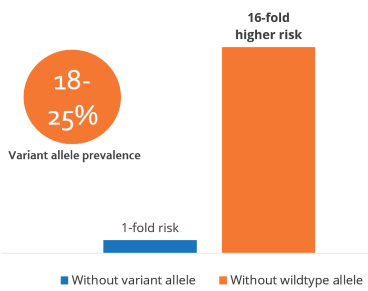 The anti-cholesterol statins can cause muscle-related side-effects (myopathy)
The anti-cholesterol statins can cause muscle-related side-effects (myopathy)
Personalize your statin and its dosage to avoid severe conditions such as myopathy, myalgia and rhabdomyolysis
16-fold higher risk of myopathy
Statin is the most commonly prescribed drug for reducing high cholesterol. Genetic variations in genes that regulate metabolism can lead to adverse effects that result in myopathy (muscle damage), myalgia (muscle pain) and rhabdomyolysis (breakdown of muscle fibres).
10-20% of statin-administered population has a genetic variation that can lead to muscle adversities. While one copy of the variant increases the risk 3-4 fold, having two copies increases risk up to 16-fold, with kidney damage also seen in the long-term. Most of these patients experience muscle pain or other events. Even in the absence of pain, creatine kinase levels may be elevated in some patients.
Choose the right statin and dose
The test identifies people at high risk, intermediate risk and low risk of statin-induced myopathy based on the genetic variation in a statin transporter. High or intermediate risk patients will be advised to change their drug to a lower-risk statin or alternative anti-cholesterol drug. If statin has to be used, a lower dosage of current statin, or lower-risk statin may be advised. Low risk patients may start or continue statin therapy as normal.
Lower statin transport increases muscle adversities
SLCO1B1 codes for a transporter of statin in the liver, where it facilitates the hepatic absorption and metabolism of statin from bloodstream. Statin transport and metabolism are affected by SLCO1B1 variants leading to side-effects. The variant causes poor statin transport and metabolism leading to higher levels of statins in circulation, and increased exposure to the drug. This increases the risk for statin-induced muscle adversities, such as myopathy and, rarely, rhabdomyolysis, which may cause nephropathy (kidney damage).
The test identifies individuals at increased risk for statin-induced myopathy by genotyping SLCO1B1 521 using allele-specific real-time PCR. The method has almost 100% analytical accuracy and sensitivity. Patient’s relatives with high cholesterol levels are also recommended this test.
References
Ramsey LB et al. 2014, Clinical Pharmacology and Therapeutics
Link E et al. 2008, The New England Journal of Medicine
